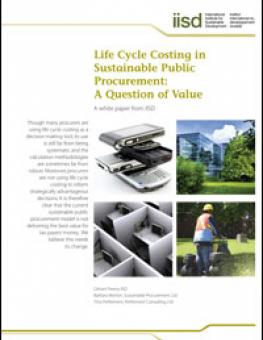
Life Cycle Costing in Sustainable Public Procurement: A Question of Value
Life-cycle costing (LCC) moves beyond the purchase price of a good or service, to also include all other significant cost flows over the entire life period of a product or service. More specifically, LCC analysis thus also includes operating costs, end-of-life costs and the longevity and warranty time frames of the assets. Through this report IISD finds that, although many procurers have been using LCC as a decision-making tool, its use is not yet systematic. This observation leads to the conclusion that procurement policies, even sustainable public procurement ones, are suboptimal. A total of 24 issues are identified and discussed in this report.
The fact that LCC is not yet considered a critical component of sustainable public procurement emerges due to a number of factors. Among others, budgetary decisions based on life-cycle costing may imply higher up-front costs, which is often unattractive for governments who want to make procurement decisions based on the lowest possible costs. In the same vein, compared to financial returns, socioeconomic gains from procurement decisions are often not factored in sufficiently. However, the higher initial costs of using LCC are related to a number of non-budgetary causes. There are, for example, still many research gaps in the application of LCC. Similarly, a lack of competence in conducting LCC, and insufficient tools and data to do it properly, make its use much less attractive.
A lack of motivation to use LCC often arises from the fact that financial gains or long-term benefits from its use will likely occur after the original procurement decision maker's time in office. Therefore, LCC should become part of public expenditure policy. This requires a build-up of capacities, tools, platforms and expertise to do LCC properly. It also demands an understanding that higher investments may be necessary to reach success. In this regard, it could be useful if organizations are allowed to retain some savings achieved through SPP to invest back into new initiatives.
You might also be interested in
December 2024 | Carbon Minefields Oil and Gas Exploration Monitor
In November 2024, 23 oil and gas exploration licences were awarded across five countries, with Russia granting the licences that account for the largest portion of embodied emissions.
Toward a Coherent, Transformative Approach to Financing Sustainable Development, Climate, and Nature
Four key proposals for the Fourth Financing for Development Conference (FfD4) to create an integrated, equitable approach to financing climate, nature, and development goals.
Green Public Procurement in India
This report analyzes the status of green public procurement (GPP) in India and suggests key strategies for advancing sustainable procurement practices.
Sustainable Asset Valuation (SAVi) of a Small-Scale Tree Planting Initiative in Côte d'Ivoire
This report analyzes the social, economic, and environmental outcomes of a small-scale tree planting initiative at schools in Côte d'Ivoire.